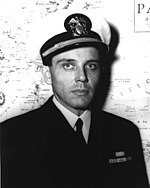Robert W. Copeland, Date of Birth, Place of Birth, Date of Death
TweetRobert W. Copeland
United States admiral
 Date of Birth: 09-Sep-1910
Date of Birth: 09-Sep-1910
 Place of Birth: Tacoma, Washington, United States
Place of Birth: Tacoma, Washington, United States
Date of Death: 25-Aug-1973
Profession: lawyer, military officer
Nationality: United States
Zodiac Sign: Virgo 
About Robert W. Copeland
- Rear Admiral Robert Witcher Copeland (September 9, 1910 – August 25, 1973) served during World War II. Copeland was born in Tacoma, Washington.
- Enlisted in the Naval Reserve in 1929, he was commissioned as a Naval Reserve officer in 1935.
- Copeland practiced law from 1935 until 1940, when he was ordered to active duty during the Navy's pre-World War II expansion.
- During the war, he commanded Pawtucket (YT-7), Black Douglas (PYc-45), Wyman (DE-38) and Samuel B.
- Roberts (DE-413). During the Battle off Samar, October 25, 1944, while commanding Samuel B.
- Roberts, Lieutenant Commander Copeland led his ship and crew in an attack on a superior Japanese battleship and cruiser force.
- Though his ship was lost, this action helped defeat the Japanese counter-offensive against the Leyte invasion.
- For this, he was awarded the Navy Cross, and shared the Presidential Unit Citation with the rest of Task Unit 77.4.3 According to the action report of the USS Samuel B.
- Roberts, "The crew were informed over the loud speaker system at the beginning of the action, of the Commanding Officer's estimate of the situation, that is, a fight against overwhelming odds from which survival could not be expected, during which time we would do what damage we could.
- In the face of this knowledge the men zealously manned their stations wherever they might be, and fought and worked with such calmness, courage and efficiency that no higher honor could be conceived than to command such a group of men."Following World War II, Copeland resumed his law career while remaining a member of the Naval Reserve, in which he rose to the rank of Rear Admiral.
- Robert W.
- Copeland died at Tacoma, Washington, on August 25, 1973. In 1980, the frigate USS Copeland (FFG-25) was named for him.
Read more at Wikipedia
See Also
- Famous People's Birthdays on 09 September, United States
- Famous People's Birthdays in September, United States
- Famous lawyer's Birthdays on 09 September, United States
- Famous lawyer's Birthdays in September, United States
- Famous military officer's Birthdays on 09 September, United States
- Famous military officer's Birthdays in September, United States

